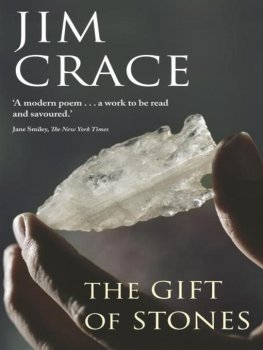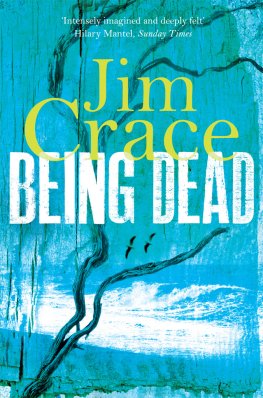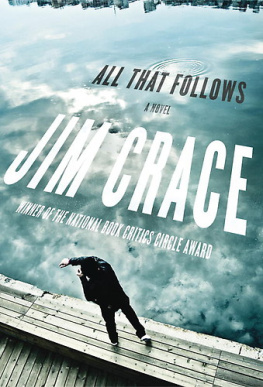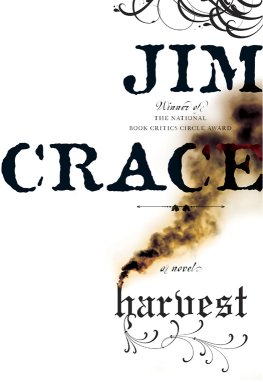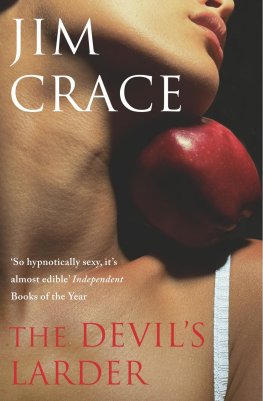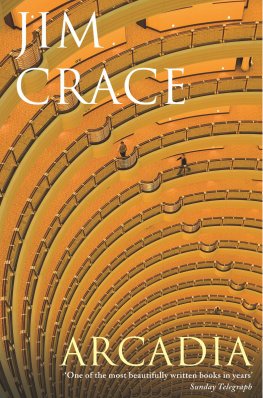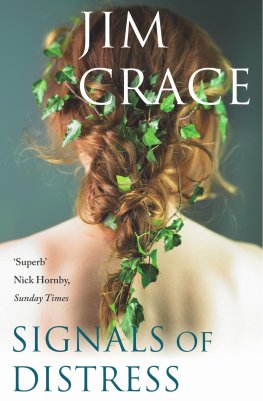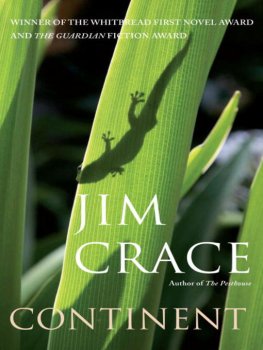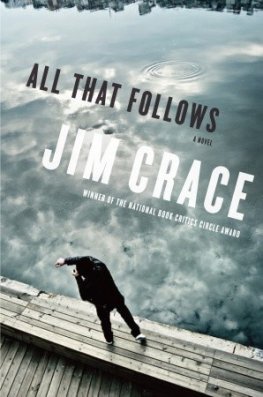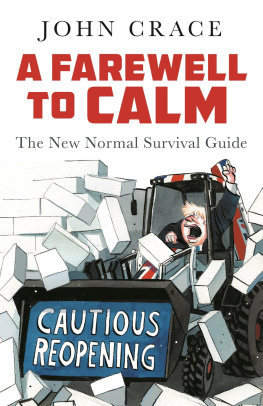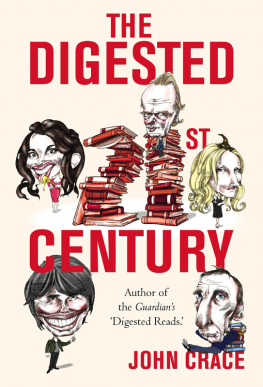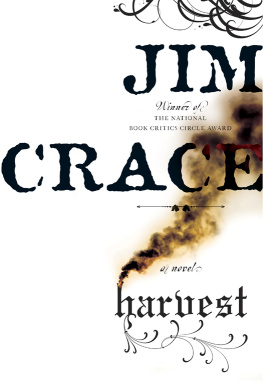Jim Crace
The Gift of Stones
I asked my boys to search and sort the flints in the spoil heap by the mine. They had high hopes of finding implements, a broken arrow at least. All they found, in fact, was the skeletal lower arm of a child. Marks on the hinge joint of the ulna suggested that it had been removed by surgery of some kind. We sent the bones across to Carter for some tests and then we entertained ourselves that night, in the darkness of our tents, inventing reasons why the arm was there, and what the fate had been of that childs other bones.
SIR HARRY PENN BUTLER, Digs and Diversions Memoirs of an Excavationist (1927)
MY FATHERS right arm ended not in a hand but, at the elbow, in a bony swelling. Think of a pollard tree in silhouette. That was my fathers stump. Its skin was drawn tight across the bone and tucked frowning into the hole left by the missing lower joint. The indented scar was like those made in the ice by boys with stones a small uneven puncture, wet with brackish pus. The arm was rarely dry or free from pain. As he grew older it would seem (he said) that his wasted and unsummoned semen had found less rewarding outlets from his body than he would have wished. He picked it rolled and spongy from the corners of his eyes after sleep. It gathered on his tongue and stretched into stringy tresses when he laughed or spoke. It formed white blisters on his lips, on his thighs, between his toes. It dried and hardened in his nostrils. And it formed pools of sap in the vents of his severed elbow.
He would invent tales to explain the injury. The arm was taken by a drunk and hungry traveller who mistook it for a chicken. Or it came away at his birth when the women, made impatient by their night-long vigil, tugged too hard upon it. Or it was torn free by an animal no one knows its name. One bite.
I his daughter and his only child took his most frequent, detailed repetition as the truth. It was less fantastic than his other tales and his expression, in its narration, lacked the usual mannerisms of the storyteller, the floating eyebrow, the single, restless hand, the dramatic contours of the voice. He was small and young. The tides were forming crosses on the sandspit. The wind was twisting untidy braids in the manes of horses. The bracken was brown with blood. I can retell it word for word.
At dawn some men had come on horseback to trade. What they wanted, they said, were arrowheads, some spear-stones, some tools. They had heard that those made in the village were the very best. And, in exchange, what could they offer? The stoneworkers looked in vain for the sides of deer, the skins, the livestock, the cheeses, the baskets of emmer grain which were the usual tokens of trade. These men had none. All they carried were their bows and staves. Dismount at the edge of the village, they were asked. Leave your horses in the care of boys. But they refused. They rode instead between the homes. They clapped their hands like children, calling out obscenities and threats. This is the trade that they would offer: for arrowheads and spear-stones and tools they promised the villagers a year of freedom from attack. Acquiesce, they said, or we will take this village from you.
Of course, we simply turned our backs, said my father. They could shout and shake their sticks and rear their horses at our doors until night came for all we cared. They could help themselves to our village and its stone. Then what? Could they work it? Could they fashion what they wanted from the shattered, clumsy pieces of rough flint which were carried from our pits? He rehearsed for us the scripture of our village that we could not be touched because we possessed the gift of stones. If all that the outside world needed was to pound and crush and hammer like savages then any rock would do. But once they wanted more, to pierce and slice, to cut and scrape, to remove the flesh from the inner side of pelts for making clothes, to have harpoons and arrows light and sharp enough to fly and kill, to cut back wheat with just one sickle-stroke, then they, those farmers, horsemen, fishers, wrights, could not be free of us and we were safe. Our skills had made us arrogant, my father said. But let the truth be told. Anyone can ride a horse and shake a stick. There are men enough for that and some to spare.
It was his misfortune to be walking from the beach when the men on their horses rode empty-handed from the village. He had with him in a sling a dozen scallops which he had hunted with his toes in the sandspit between the tides. He liked the springy, bracken path that led up from the crusty boulders of the shore, with the wind and spray at his back, spitting and whispering, Go home to your house and fire. Go home. So he was in no mood and of no age to treat the horsemen with suspicion or to roll into the undergrowth when they called him over to them.
Here, perhaps, a picture of my father as a boy should take its place between the bracken and the riders and the sea. It was his seventh year and though there were children of his own age and younger whose weight and muscles had matured, he was still a bulrush of a boy, a stem, his elbows both elbows, still thinner than his arms, his chest as flat and formless as a slate. His cousins said his face was disobedient and dreamy, a combination which they found more than doubly irritating. Perhaps it was this challenge and this indifference in his face which caused the riders to treat him roughly. They paced their horses round him and one put out his hand to take the scallops. My father was small and fast and unafraid of horses. He rolled beneath a mare and disappeared into the bracken. And then he showed himself again, standing and jeering on a rock where the horses could not reach.
The picture is incomplete. What he did not see, what only now I can construct in my imagination and place a little distance from the horses, was one other man, dismounted, bow raised and drawn, arrow loosed. It struck the boy, my father, in the arm below the elbow in the arc of flesh which hangs like cobwebs from the bone. It broke the skin but did not enter. Its flight had been uneven. Its head was far too crude and heavy for the sapling reed which was its shaft. But then, what could it matter? The skin was pierced and the goats purge or the urchin milk or the silverdew which provided venom for the point had mingled with his blood and he was all but dead.
It is better to bleed than not to bleed when there is poison in your blood. My father put his own knife to his wrist and cut a line, half-heartedly, across the three mauve filaments beneath the skin.
Give us the details, we, his audience, would say. Tell us once again how your blood flowed like a cliff spring down your arm, into the sling, onto the scallops, how the landscape turned from bracken-brown to red, how the bracts on the under-leaves stuck to the thickening blood as you toppled from the rock. Tell us, too, about the rich foliage that would have grown, coddled, germinated by the blood. What mushrooms, toadstools; what grubs, what flies, might have flourished there if you had simply fallen and not staggered to your feet again?
That one dismounted man, the bowman barely twice my fathers age, had come blundering through the bracken to retrieve his arrow and who can tell to put an end to that small boy. My father had sense enough to know the meaning of the stave that the bowman was swinging in his hands and strength enough to run.
Here my fathers voice would drop as he, the skilful storyteller, detailed the list of those sensations which gave power to his flight. The bracken, snapping underfoot like kindling to a flame, the bowmans broken bracken gaining on the boys. The hubbub of the riders and their mounts. The wind, Go home. Go home. To your houses. And your stone. My fathers lungs, his blood, his elbow. The resolutions for the future that he made. His dry and swollen tongue of fear.

